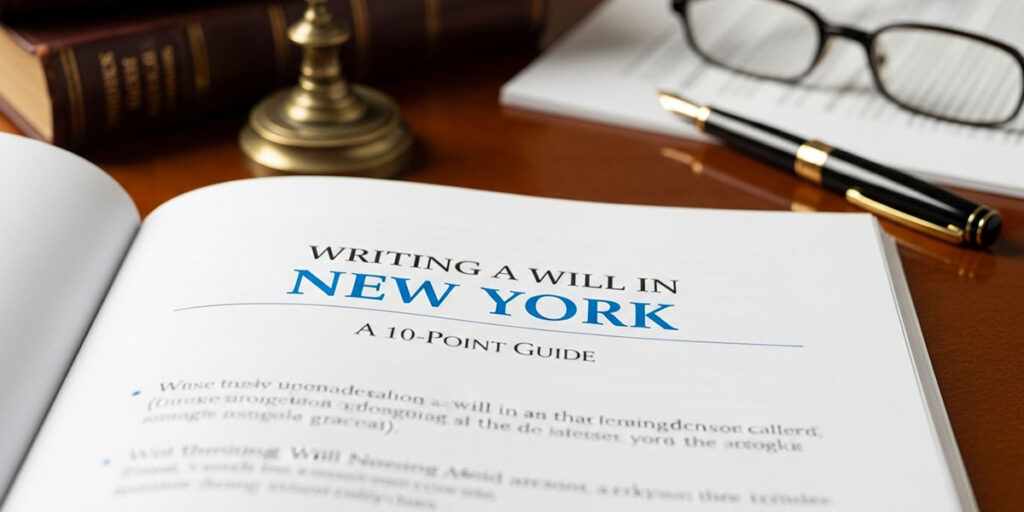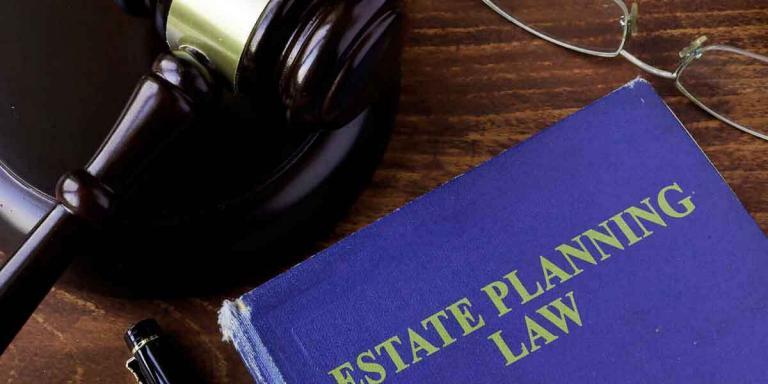Writing a Will in NY: A Lawyer’s Top 10 Checklist
A Last Will and Testament is arguably the most important document you will ever create. It is your final instruction, your voice after you are gone, and the primary tool for protecting the people and legacy you hold dear. Yet, for all its importance, the process of writing a will is surrounded by misconceptions and pitfalls. Many New Yorkers either postpone this crucial task indefinitely or turn to cheap online templates, believing a will is a simple fill-in-the-blank form. This could not be further from the truth.
As a New York attorney with more than 30 years of experience in estate planning, I have seen the profound difference between a professionally drafted will and one that is hastily or improperly prepared. A well-crafted will provides clarity, peace, and an orderly transition. A flawed will can ignite family disputes, incur unnecessary costs, and undermine your final wishes entirely. To empower you to make the right choices, the legal experts at Morgan Legal Group have compiled this definitive guide to the 10 essential things every New Yorker must understand before writing a will.
1. A Will Is Your Ticket to Probate, Not Around It
Let’s begin by dismantling the single most common myth about wills. Many people believe that if they have a will, their estate will avoid court. The reality is the exact opposite. A will is a document written expressly *for* the New York Surrogate’s Court. The legal process of submitting, validating, and executing a will is called probate. Your will is the central piece of evidence in this proceeding.
What Probate Accomplishes
The probate process serves several critical functions:
- Validates Your Will: The court officially confirms that your will is authentic and complies with all New York legal formalities.
- Appoints Your Executor: The person you name in your will to manage your estate (the Executor) has no authority until the court formally grants it through a document called “Letters Testamentary.”
- Creates a Public Record: The will and an inventory of your probate assets become public information, accessible to anyone who requests it.
- Supervises Administration: The court oversees the Executor to ensure they gather assets, notify creditors, pay debts and taxes, and distribute property according to your instructions.
Thinking a will avoids probate is like thinking a passport lets you skip airport security. In reality, the passport is the very document you need to get *through* security. Similarly, your will is the document you need to get through the probate process. If your primary goal is to avoid court, you need other tools, such as a revocable living trust, which is a key component of a comprehensive wills and trusts plan.
2. The Strict Formalities of Execution are Non-Negotiable
New York’s Estates, Powers and Trusts Law (EPTL) § 3-2.1 lays out very specific, inflexible rules for how a will must be signed and witnessed. A failure to follow these “execution formalities” to the letter can cause the court to invalidate your entire will, no matter how clearly your intentions are stated. This is the number one reason DIY wills fail.
The New York Will Execution Ceremony
For a will to be valid in New York, the following must occur:
- It Must Be in Writing: Oral wills are not valid in New York (with extremely limited exceptions for mariners at sea or soldiers in armed conflict).
- It Must Be Signed at the End: You, the testator (the person making the will), must sign at the very end of the document. Anything written after your signature is typically ignored by the court.
- You Must Declare It’s Your Will: You must declare to the witnesses that the instrument you are signing is your will. This is called “publication.”
- It Must Be Witnessed by Two People: At least two witnesses must watch you sign the will, or you must acknowledge to them that the signature on the will is yours.
- The Witnesses Must Sign: The witnesses must sign their names and addresses on the will within a 30-day period.
This isn’t just a list of suggestions; it’s a legal ceremony. An experienced attorney like Russel Morgan, Esq., supervises this ceremony to ensure every step is flawless, often including a self-proving affidavit that makes it much easier to probate the will later.
3. You Must Choose Your Executor Wisely
The Executor is the fiduciary you nominate to be the quarterback of your estate. This person is responsible for navigating the probate process, managing your assets, and carrying out your wishes. It’s a role of immense trust and significant work. Choosing the right person is paramount.
Qualities of a Good Executor
- Trustworthiness: This is the most important quality. The Executor will have legal control over all of your assets.
- Organization and Diligence: The role involves a great deal of paperwork, deadlines, and communication with banks, courts, and beneficiaries.
- Residency:
- Impartiality: If you anticipate potential family law type disputes, choosing a neutral party, like a bank’s trust department or an attorney, can be a wise decision.
Always Name a Successor
What happens if the person you choose is unable or unwilling to serve when the time comes? They may have passed away, become ill, or simply not want the responsibility. For this reason, your will should always name at least one successor Executor. Without a named successor, the court will have to appoint someone, a process that can cause delays and disputes. Careful consideration of this choice is a key part of the service provided by our firm.
4. For Parents, Naming a Guardian is a Will’s Most Important Job
If you have minor children, all other aspects of your will pale in comparison to this one function: nominating a guardian. A will is the *only* legal document where you can state who you want to raise your children if you and their other parent are no longer able. This is not a suggestion to the court; it carries immense legal weight.
The Consequences of Not Naming a Guardian
If you fail to nominate a guardian in your will, the decision of who will raise your children will be left to a judge in a guardianship proceeding. The judge will do their best to act in the “best interests of the child,” but they do not know your family, your values, or your wishes. Different family members may come forward to petition for guardianship, potentially leading to a painful and divisive court battle. By nominating a guardian in your will, you provide a clear roadmap for the court and spare your family this anguish.
Choosing a Guardian: Key Considerations
This is a deeply personal decision. You should consider:
- The potential guardian’s age, health, and stability.
- Their parenting style and values.
- Where they live and whether a move would be disruptive for your children.
- Their financial situation (though you will provide for your children’s care through your estate).
It is crucial to discuss this with your chosen guardian beforehand to ensure they are willing to accept this profound responsibility. You should also name an alternate guardian in case your first choice cannot serve. If you need guidance on this, don’t hesitate to contact us.
5. Not All of Your Property Passes Through Your Will
A common mistake is assuming your will controls the distribution of all your assets. In reality, many valuable assets pass to their new owners completely outside of the probate process and are not affected by the terms of your will. These are known as “non-probate” assets.
Common Types of Non-Probate Assets
- Assets with Beneficiary Designations: This is the largest category. It includes life insurance policies, retirement accounts (like 401(k)s and IRAs), and bank or brokerage accounts with a “Payable on Death” (POD) or “Transfer on Death” (TOD) designation. These assets pass directly to the person named as the beneficiary.
- Property Owned as Joint Tenants with Rights of Survivorship: If you own real estate or a bank account with someone else as “joint tenants,” the surviving owner automatically inherits the entire asset. This is common for married couples.
- Assets Held in a Trust: Any asset you have titled in the name of a trust is controlled by the trust document, not your will.
It is critical to coordinate your will with your non-probate designations. For example, if your will leaves everything to your spouse, but your old life insurance policy still names your ex-spouse as the beneficiary, the ex-spouse will get the money. A comprehensive estate planning attorney reviews all your assets to ensure your entire plan is harmonized.
6. A “No-Contest” Clause Can Deter, But Not Prevent, Challenges
If you anticipate that an heir might be unhappy with their inheritance and may challenge the will, you can include what is known as a “no-contest” clause, or an *in terrorem* clause. This clause states that if a beneficiary challenges the will and loses, they forfeit any inheritance they were set to receive.
How It Works in New York
In New York, no-contest clauses are enforceable, but with important exceptions. Under state law, a beneficiary can still bring certain actions without triggering the clause. For example, they can conduct preliminary discovery to investigate the facts before formally filing a contest, challenge the court’s jurisdiction, or object on the grounds that the will was a forgery or was revoked by a later will. The purpose of this clause is to discourage frivolous lawsuits, but it is not an ironclad shield against a determined challenger. It’s a nuanced tool that requires expert drafting to be effective, especially in complex estates managed in jurisdictions like New York City.
7. Your Will Must Have a “Residuary Clause”
This is a technical but absolutely vital component of any well-drafted will. After making specific bequests (e.g., “I give $10,000 to my sister”), what happens to the rest of your property? The “residuary clause” answers this question. It identifies who receives the “residue” — all the remaining assets of your estate after debts, taxes, expenses, and specific gifts are paid out.
Why the Residuary Clause is Critical
Without a residuary clause, any asset not specifically mentioned in your will (or any gift that fails because the beneficiary has predeceased you) falls into a legal black hole. This property would then be distributed according to New York’s intestacy laws, as if you had no will at all for that portion of your estate. This can lead to unintended beneficiaries inheriting your property and can complicate the estate administration significantly. A professionally drafted will always contains a comprehensive residuary clause. If you need to create one, you can schedule an appointment with our team.
8. You Can’t Completely Disinherit a Spouse in New York
Many people believe they have the absolute right to leave their property to whomever they choose. However, New York law provides strong protections for surviving spouses. You cannot use your will to completely disinherit your spouse unless they have signed a valid prenuptial or postnuptial agreement waiving their rights.
The Spousal “Right of Election”
Under EPTL § 5-1.1-A, a surviving spouse has the right to “elect” to take a share of the decedent’s estate, regardless of what the will says. This elective share is the greater of $50,000 or one-third of the “net estate.” The net estate is a broad calculation that includes not only the probate assets but also certain non-probate “testamentary substitutes,” like assets in a revocable trust. This is a complex area of law where elder law and estate planning intersect, and it’s a critical reason to seek professional advice rather than relying on a DIY document.
9. A Will Must Be Updated After Major Life Events
A will is not a “set it and forget it” document. It is a living document that should evolve as your life changes. Failing to update your will after a significant life event can lead to disastrous and unintended consequences. You should review your will with your attorney every 3-5 years, and immediately after any of the following events:
- Marriage or Divorce: Divorce generally revokes any provisions in favor of your ex-spouse, but marriage gives a new spouse significant rights.
- Birth or Adoption of a Child: You need to include your new child in your will.
- Death of a Beneficiary or Fiduciary: If a beneficiary, Executor, or Guardian named in your will passes away, you must update your plan.
- Significant Change in Assets: A large inheritance, the sale of a business, or a major change in your net worth may require changes to your estate plan.
- Moving to Another State: While a will valid in New York is generally valid elsewhere, the new state’s laws on issues like community property or spousal rights may be different.
Proactive reviews are a sign of responsible planning. These reviews also help protect against claims of elder abuse or undue influence by demonstrating a consistent and thoughtful planning process over time.
10. DIY Wills Are a Minefield of Risk
This final point serves as a summary of all the risks discussed above. Online will-creation websites have become popular, but they represent a classic case of “penny wise and pound foolish.” These services are platforms, not law firms. They cannot provide legal advice, and their one-size-fits-all templates cannot account for the complexities of your life or the nuances of New York law.
The Hidden Costs of a “Cheap” Will
The few hundred dollars you might save by using a DIY service can cost your family tens of thousands of dollars later on. Consider the potential mistakes:
- Improper Execution: An invalid will is worse than no will at all.
- Failure to Harmonize: The template won’t coordinate your will with your non-probate assets.
- Ignoring Legal Nuances: The service won’t tell you about the spousal right of election or the best way to craft a no-contest clause.
- Lack of Customization: A template cannot create a testamentary trust for your children or plan for a beneficiary with special needs.
- No Legal Counsel: There is no substitute for the advice of a human lawyer who can ask the right questions and spot potential problems. For more information, the legal experts at Nolo also emphasize these state-specific requirements.
Your will is a bespoke legal document, not a commodity. The peace of mind that comes from knowing it was done right by a professional is invaluable.
Your Legacy Deserves Professional Guidance
Writing a Last Will and Testament is a profound act of love and responsibility. It is your final chance to provide for your family, protect your children, and ensure your assets are distributed according to your wishes. As we have seen, this process is governed by strict legal rules and filled with potential pitfalls. Navigating it without expert legal counsel is a risk no one should take.
At Morgan Legal Group, we understand that a will is more than just a legal document—it’s the cornerstone of your legacy. We dedicate ourselves to understanding your unique story and crafting a will that is not only legally sound but also a perfect reflection of your intentions. Don’t leave your family’s future to a template. Invest in the professional guidance your legacy deserves.
If you are ready to create or update your will, take the first step today. Protect your loved ones from the uncertainty, cost, and conflict of a flawed plan. Contact Morgan Legal Group to schedule a consultation with our experienced New York estate planning attorneys. We are here to guide you with compassion and expertise. Find out more about us on Google.







